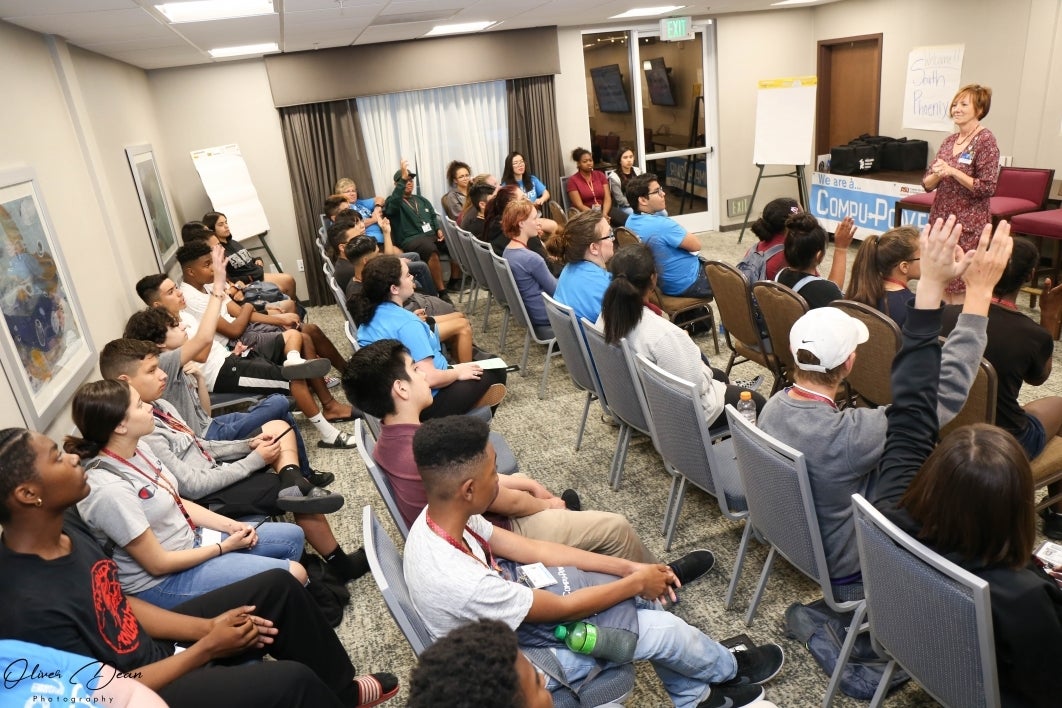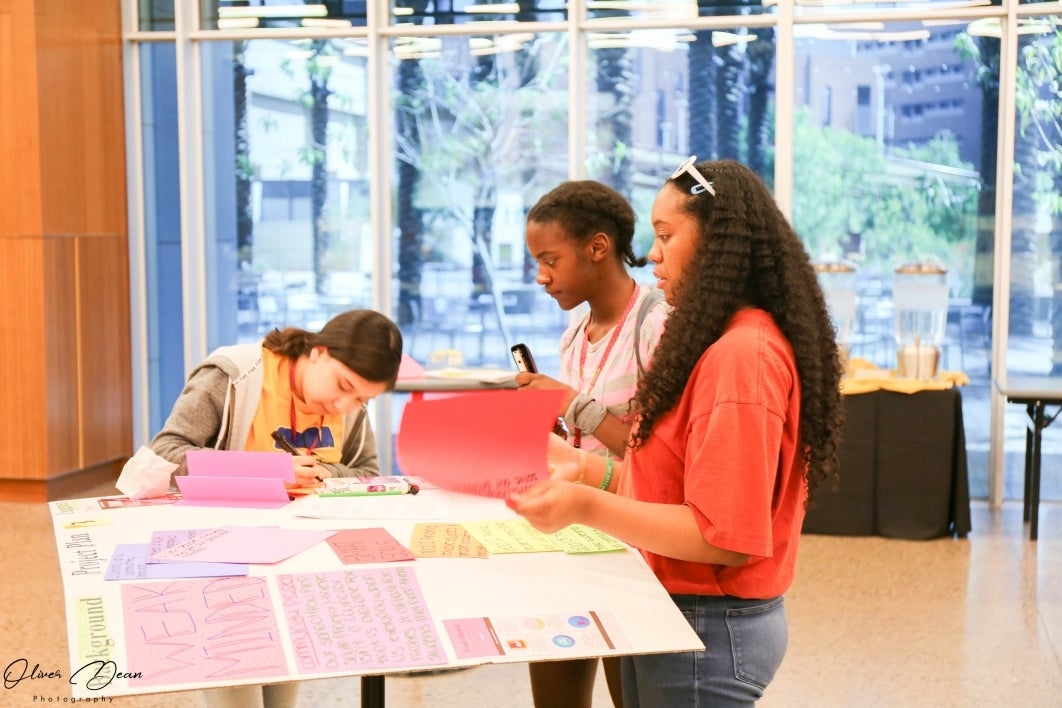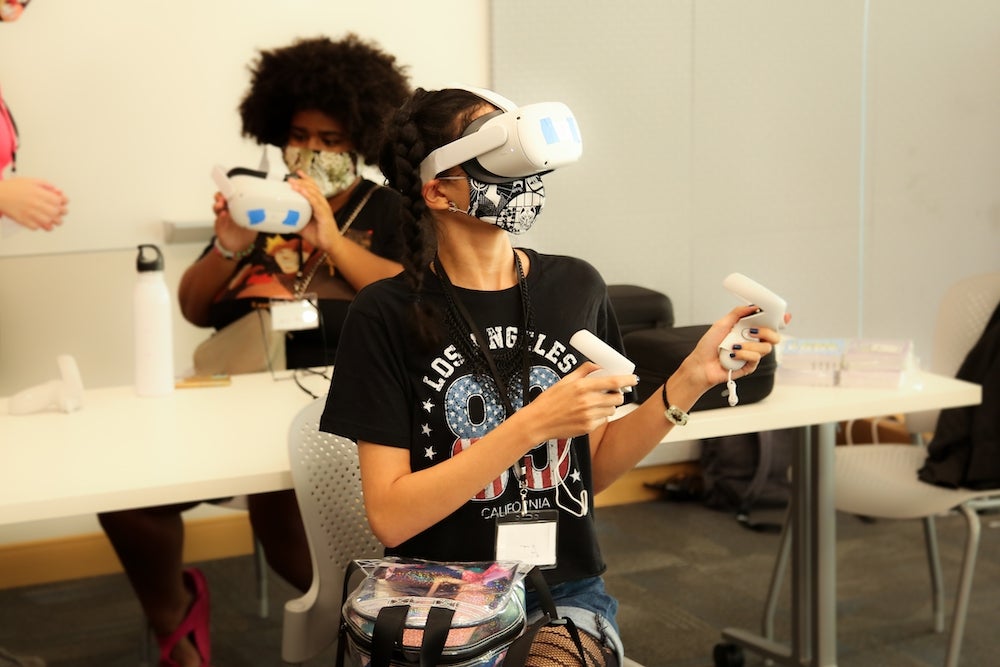ASU center celebrates 5 years of successful STEM programming initiatives

During a presentation in 2016, a research assistant demonstrates how the social programmable robot works and how it is used while teaching girls to code in the CompuGirls programming. Photo courtesy of the Center for Gender Equity in Science and Technology
The Center for Gender Equity in Science and Technology is celebrating five successful years of programming initiatives at Arizona State University. Over the course of the last five years, the center has worked with a wide range of students, parents, schools and industry partners not only in Arizona but throughout the United States and internationally.
The center is a one-of-a-kind research center that was founded in 2016 by Kimberly Scott, a professor in women and gender studies at ASU and the creator of the CompuGirls programming that has been implemented since 2007. The CompuGirls culturally responsive technology curriculum is the foundation of the center’s programming. With innovative programs such as CompuPower, Cyber Warriors and Girls in Tech, the center has proven time and time again that its impact is far-reaching and its programs are doing their part to fill the STEM pipeline with historically underrepresented students.
Furthermore, what the center does “is more than inspire girls to pursue STEM, but really helping them to feel empowered to know themselves better, know their cultural identity better and really incorporate their personal and career identity together,” said Chun Tao, a current postdoctoral scholar at Stanford and former graduate student researcher at the center.
When interviewing past staff and partners at ASU for a testimonial series to celebrate the fifth anniversary, it was clear that the mission and goals of the organization were what drew each individual to working with the center and that those passions are what have fueled the center. Over the last five years, the center has stayed true to its mission "to actively drive the discourse and experiences of underrepresented girls in STEM by owning, generating and critiquing the collective body of scholarship on, and offering culturally responsive programs for, girls of color and STEM education."
Patricia Garcia, an assistant professor at the University of Michigan, was the first postdoctoral scholar hired into the center after completing her PhD at UCLA. When asked about her attraction to the center, she said “it was the first time that I actually saw an approach that was asset-based and was really thinking about what students of color, what skills and knowledge they already possess and how we can actually leverage those to open up pathways in STEM.”
Gabriel Escontrías, the former manager at the Center for Gender Equity in Science and Technology, said that “if you join the center, I think you’re joining it for its mission.”
"It is exciting the growth I continue seeing,” he said.
Escontrías left the center to run for the Arizona state Senate and has continued to collaborate with the center over the years, including leading a workshop on Latina representation in STEM at the upcoming anniversary retreat for staff, students and associate faculty.
Elizabeth Wentz, the current dean of the Graduate College; Ji Mi Choi, vice president at Knowledge Enterprise; and Patrick McDermott, chief engagement officer at Thunderbird School of Global Management, have all been a part of the center in some capacity in the last five years.
“I have incredible admiration for Kim, personally and professionally, for everything she’s achieved and for the incredible impact she has had on so many young people as they’ve come through here at ASU and the CompuGirls sites,” McDermott said.
The center has always understood that the lack of women of color in STEM is a systemic issue and that therefore the solution has to impact the entire system as a whole — the main focus couldn’t be niche but had to be far-reaching.
“It was never about moving the needle at ASU; it was always about moving the needle nationally and globally,” McDerrmott said.
This points to a unique aspect of the center: its ability to not only pull in experts and incredible leaders from all over ASU, but to be able to do the same from all over the country and develop strong working relationships with industry professionals.
"Throughout my time with the center it taught me how important it is for people like myself who sit within the policy beltway of the D.C. area, how important it is to actually reach back and reach in and hear from folks who are really close to the ground to make sure that we are putting out policy that is relevant to local populations,” said Nicol Turner-Lee, senior fellow in governance at the Brookings Institution who has collaborated with Scott over the past decade.
Gabriela González of Intel has also worked with Scott and the center for many years and says that “they’re a formidable engineer for girls research, particularly for underserved communities ... who informs policy, programmatic outreach and private industry on what works and what doesn’t work.”
These partnerships and collaborations are what allow the center to extend its reach and allow girls to strive for a career in STEM. For example, Mitzi Vilchis was a part of the CompuGirls programming in 2009, worked with Scott as a research assistant while pursuing her degree at ASU, and then went on to teach similar programming to CompuGirls in Mexico for two years with the Fulbright program. Mitzi is currently an English language development teacher at Carl Hayden High School in Phoenix.
"My life path has changed so much in a positive way, and thanks to this program and the center I am able to see a future that I never imagined before,” Mitzi said.
To view the full testimonial series and see what past staff, partners and participants have to say about the center, check out its YouTube channel and Instagram profile.
The center's programming is primarily funded through educational grants with organizations such as the National Science Foundation and the U.S. departments of Education and Defense, as well as community organizations that include Intel, Arizona Community Foundation and Helios Educational Foundation. If you are interested in supporting the center through funding, please visit the center's page on the ASU Foundation website.
More Science and technology

ASU postdoctoral researcher leads initiative to support graduate student mental health
Olivia Davis had firsthand experience with anxiety and OCD before she entered grad school. Then, during the pandemic and as a…

ASU graduate student researching interplay between family dynamics, ADHD
The symptoms of attention deficit hyperactivity disorder (ADHD) — which include daydreaming, making careless mistakes or taking…

Will this antibiotic work? ASU scientists develop rapid bacterial tests
Bacteria multiply at an astonishing rate, sometimes doubling in number in under four minutes. Imagine a doctor faced with a…




